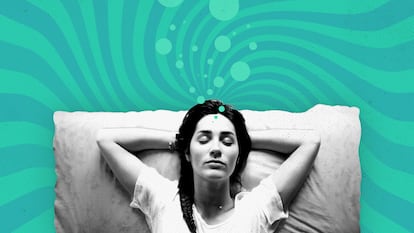Are melatonin supplements giving us nightmares?
While many are blaming bad dreams on the consumption of melatonin supplements, sleep experts haven’t found a link – but they still warn against overusing this hormone

It’s increasingly common to find melatonin – be it in capsule, jelly or drop form – on nightstands. The search for better sleep has clearly become an obsession.
In 2018, a study published in the Journal of the American Medical Association warned that twice as much melatonin was being consumed in the United States than in the previous decade. Consumption of this hormone supplement further increased during the pandemic – some pharmacists recall selling as many as 30 boxes per day.
Mild side effects of taking melatonin – which is already naturally produced by the body – have been consistently reported, such as drowsiness, dizziness, nausea and headaches, although they tend to subside shortly after discontinuing use. However, on social media, several users have recently been reporting strange dreams or nightmares after taking the hormone.
In her essay, An Ode to Darkness (2019), Norwegian journalist Sigri Sandberg refers to melatonin as the “hormone of darkness.” It is mainly secreted in the pineal gland, located at the center of the brain, when the body stops receiving signals from natural light. The gland experiences its moment of glory between 3am and 4am.
Among its functions, melatonin prepares us for sleep by dilating blood vessels and reducing body temperature. The hormone is also a very powerful antioxidant, giving us the opportunity to revitalize ourselves as we slumber.
Melatonin secretion is altered by an abundance of artificial light – something frequently experienced by many students and workers today, as they stay up late on their computers or phones. A melatonin pill, drop or gummy can supplement a body that is being affected by an excessively illuminated life. When there is little difference between night and day, the natural secretion of the hormone is disturbed.
Experts call these supplements “exogenous melatonin,” to differentiate it from what we secrete – or should secrete – without assistance.
“[Melatonin] is the hormone par excellence involved in the regulation of the wake-sleep cycle… its primary function is to induce sleep. While its main synthesis resides in the pineal gland, it is also synthesized in other organs, such as the retina, bone marrow, skin, serotonin-producing cells of the gastrointestinal tract, the cerebellum and the immune system,” explains Dr. Alba García-Aragón, a medical specialist who works at the Sleep Research Institute in Madrid.
“A circadian cycle lasts 24 hours. The start of melatonin secretion coincides with the time of day when the concentration of adenosine – a substance produced by brain activity during wakefulness – is highest. When adenosine accumulates, it causes a feeling of exhaustion. In this way, sleep is facilitated both by the accumulation of adenosine and by the progressive reduction of light that leads to the secretion of melatonin.”
A meta-analysis of 19 clinical trials involving more than 1,600 adults and children with sleep disorders showed that melatonin reduced the time to fall asleep by seven minutes. It also increased the time spent asleep by eight minutes, while improving the overall quality of sleep and relieving short-term insomnia caused by jet lag.
There are as many types of melatonin on the market as there are insomniacs in the world. “Each type is prescribed based on the symptoms reported by the patient and according to the results obtained in a previous sleep study. For this reason, it’s difficult to say that one melatonin is better than another, since each treatment must be individualized,” says García-Aragón. Some formats of the hormone – albeit milder ones – are also readily-available on grocery store shelves.
I stopped because of the nightmares. I preferred to sleep badlyMelatonin patient Anabel VC
There are few studies on the use and abuse of melatonin, although the experts consulted by EL PAÍS describe a “lack of long-term, quality data.” Dr. Odile Romero, coordinator of the Sleep Unit at the Vall d’Hebron Hospital in Barcelona, says that she has only had to withdraw melatonin due to headaches. In her clinical experience, she has not seen patients develop addictions or experience nightmares.
However, some users – who spoke to EL PAÍS on the condition of anonymity – have reported bad dreams.
“I stopped taking melatonin the day I dreamed I was an accessory to murder. It was a very vivid dream,” says one individual.
Claudia DC (not her real name) explains that she bought a bottle of 60 2mg pills on Amazon. She also remembers “disturbing dreams… so many things happened to me that I woke up exhausted, as if I had just returned from a trip.” She went to a doctor and was prescribed extended release melatonin. The dreams subsequently stopped.
Anabel VC started taking melatonin supplements to relieve jet lag from her travel-heavy schedule. “I stopped because of the nightmares. I preferred to sleep badly.” Months later, she gave it another try with smaller daily doses. “Now I have hyper-realistic dreams all night, like it’s a movie, but they’re not nightmares. [Melatonin] serves my needs,” she shrugs.
Meanwhile, M.M. takes it every night, but she has a strategy: “I calculate the time and only take it when I know I have at least eight hours to sleep, otherwise I spend the following day feeling hungover.”
Can you get hooked on melatonin? Many patients claim to be addicted, although there is no clinical evidence of this yet. On TikTok, the hashtag #melatoninaddict has a million views, and the problem is also widely discussed on Reddit. Neither platform can compete with a clinical trial, but the active conversations on the subject can’t simply be discarded.
Dr. Romero is not aware of physical addiction to melatonin. “But I think it does have a placebo effect and that many people fall asleep more easily just by taking certain products with melatonin,” she reasons.
García-Aragón also hasn’t found evidence of physical addiction in his consultations. “I haven’t seen withdrawal symptoms when someone stops melatonin consumption,” he assures EL PAÍS. That being said, he has observed “certain psychological dependence in patients undergoing prolonged melatonin treatment.”
Heavy melatonin consumers are those who have been taking increasing doses of the hormone for more than five years. When asked if this practice is dangerous, Dr. Romero says that she has not seen “significant adverse effects,” but points out: “There is some debate and scientific controversy about whether high doses of melatonin could saturate the MT1 and MT2 receptors, which are responsible for binding with the hormone… this would reduce its effect.” As a precaution – and in the absence of studies that support the safety of long-term consumption of melatonin – Dr. García-Aragón does not recommend maintaining treatment for more than three months.
About 85% of adults have at least one nightmare a year. Between 4% and 10% have one every week, probably related to stress. But little work has been done to see if nightmares, or ultra-vivid dreams, could be related to a drug. Some experts have suggested the possibility, however, that the principal proven effect of melatonin supplements may have something to do with bad dreams: lengthening the time we stay asleep.
We dream a lot in rapid eye movement (REM) sleep. This deep sleep usually begins about 90 minutes after falling asleep. It’s the part of sleep where most dreams occur. So, it’s possible that sleeping more can open the door to dreamland… and also to nightmares.
Tu suscripción se está usando en otro dispositivo
¿Quieres añadir otro usuario a tu suscripción?
Si continúas leyendo en este dispositivo, no se podrá leer en el otro.
FlechaTu suscripción se está usando en otro dispositivo y solo puedes acceder a EL PAÍS desde un dispositivo a la vez.
Si quieres compartir tu cuenta, cambia tu suscripción a la modalidad Premium, así podrás añadir otro usuario. Cada uno accederá con su propia cuenta de email, lo que os permitirá personalizar vuestra experiencia en EL PAÍS.
¿Tienes una suscripción de empresa? Accede aquí para contratar más cuentas.
En el caso de no saber quién está usando tu cuenta, te recomendamos cambiar tu contraseña aquí.
Si decides continuar compartiendo tu cuenta, este mensaje se mostrará en tu dispositivo y en el de la otra persona que está usando tu cuenta de forma indefinida, afectando a tu experiencia de lectura. Puedes consultar aquí los términos y condiciones de la suscripción digital.









































